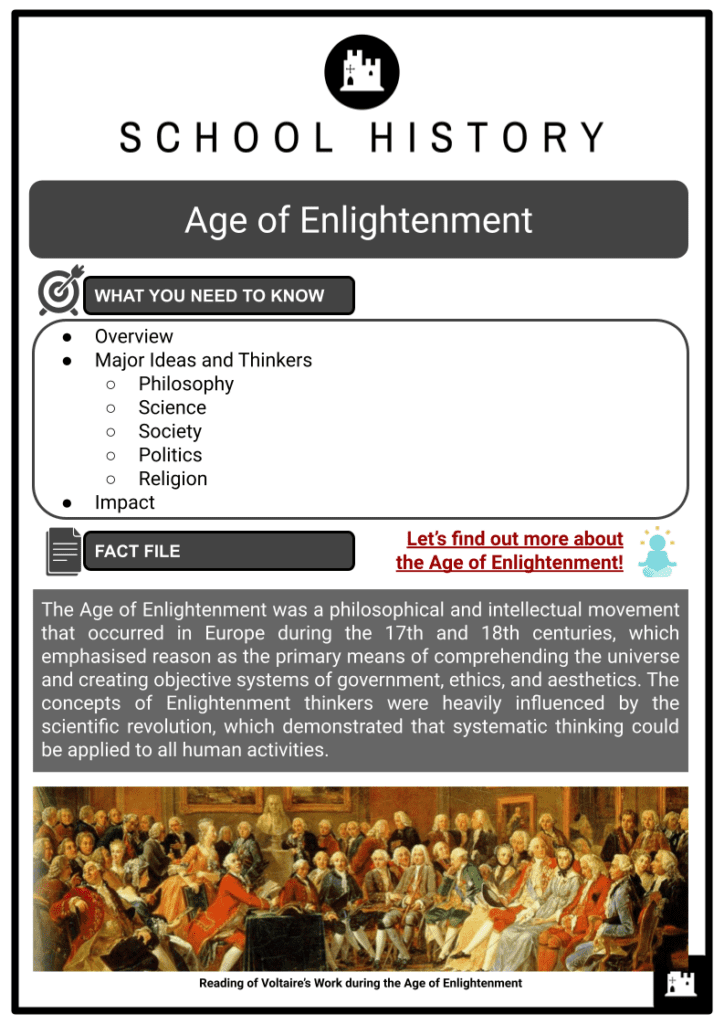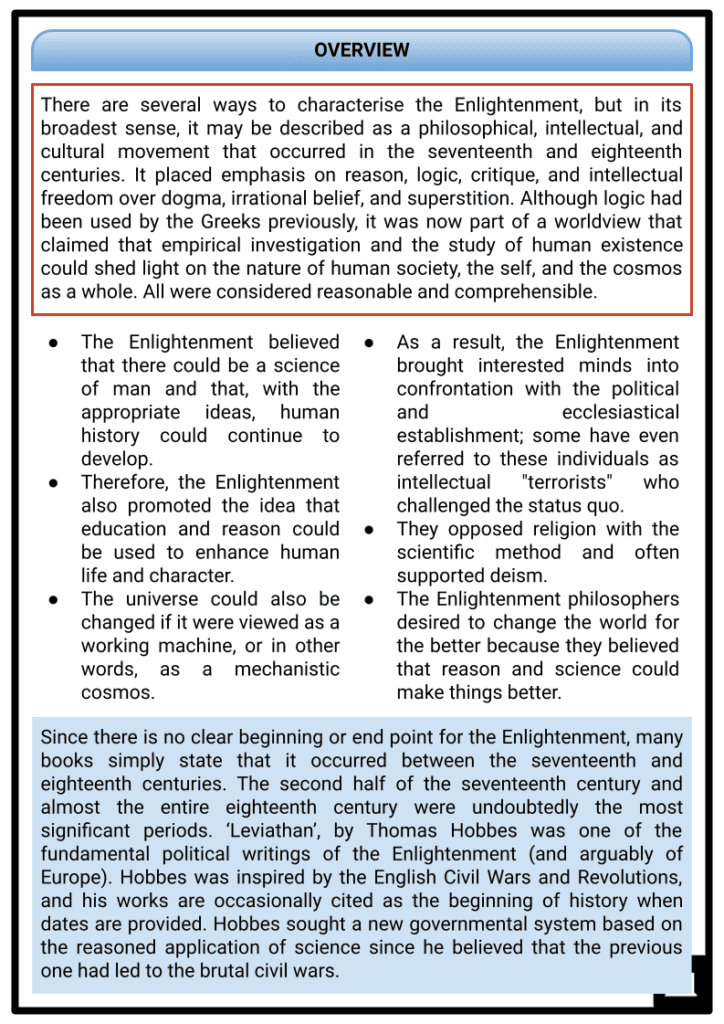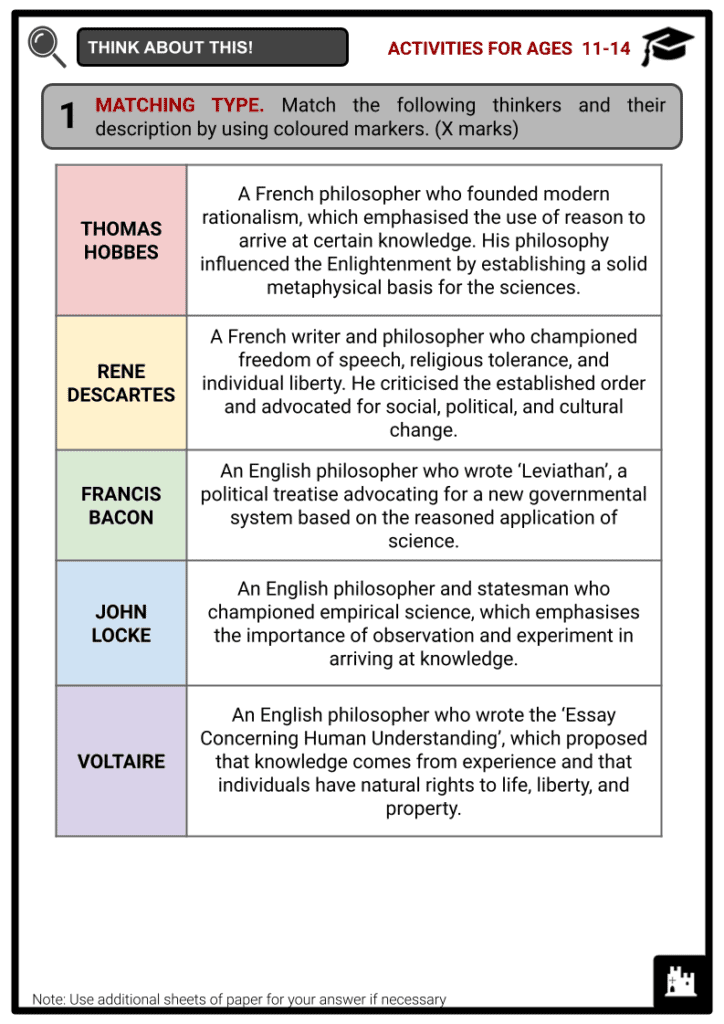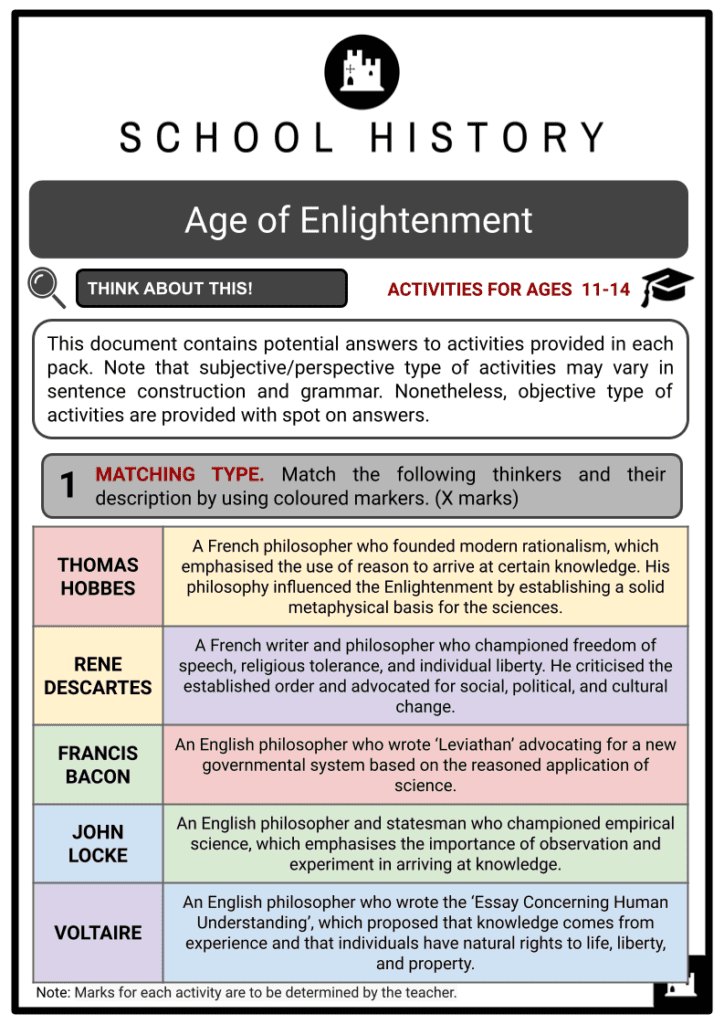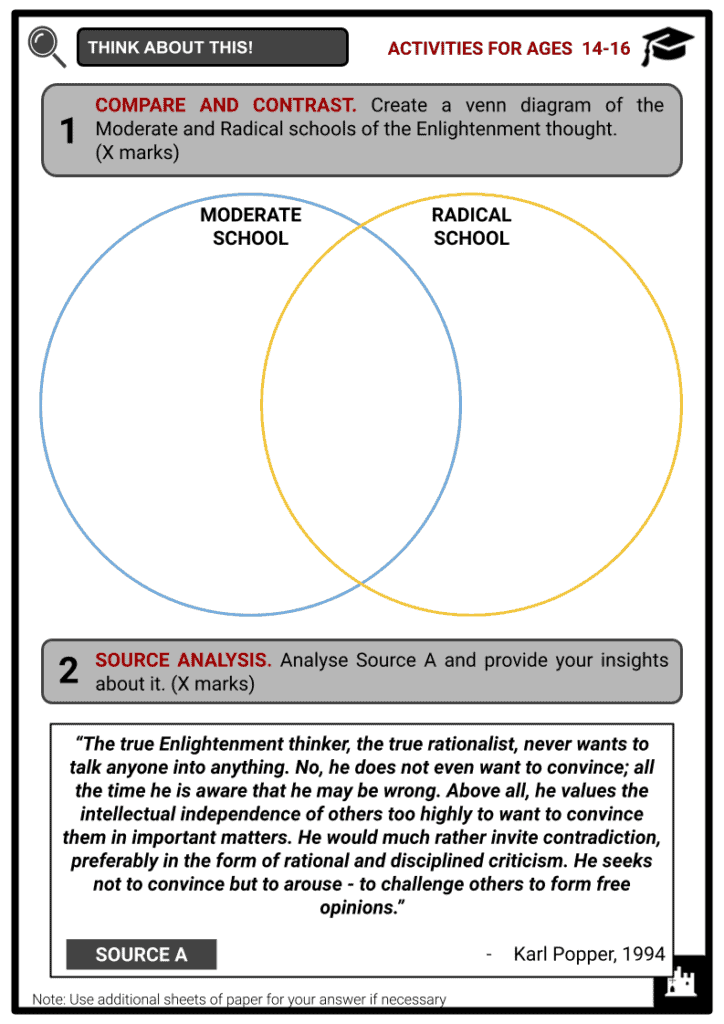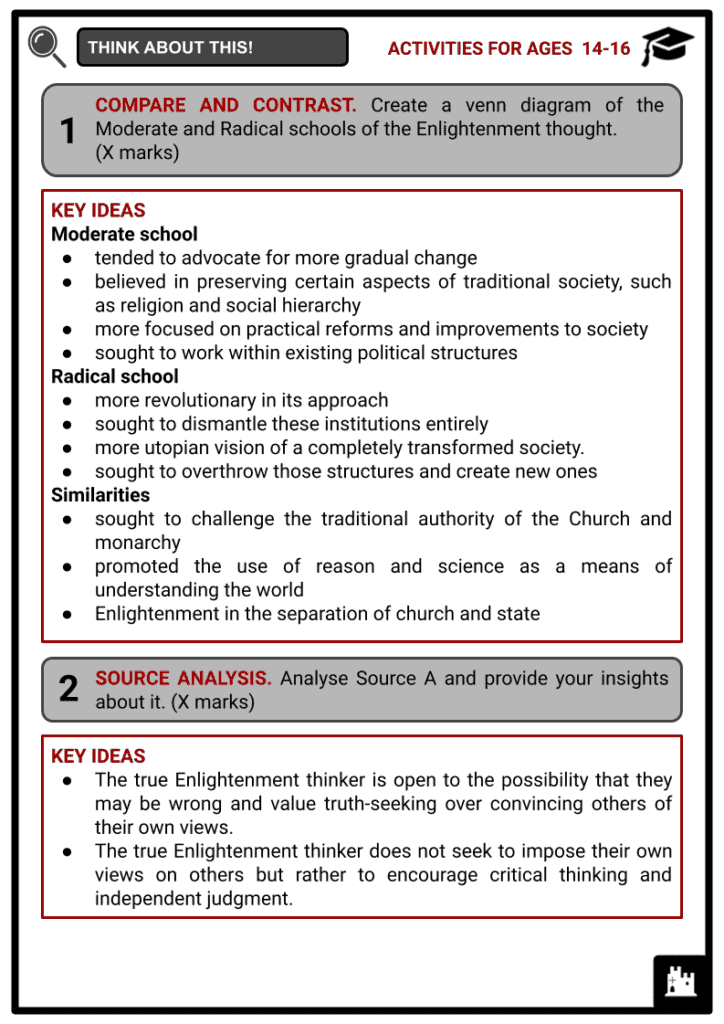Age of Enlightenment Worksheets
Do you want to save dozens of hours in time? Get your evenings and weekends back? Be able to teach about the Age of Enlightenment to your students?
Our worksheet bundle includes a fact file and printable worksheets and student activities. Perfect for both the classroom and homeschooling!
Summary
- Overview
- Major Ideas and Thinkers
- Philosophy
- Science
- Society
- Politics
- Religion
- Impact
Key Facts And Information
Let’s find out more about the Age of Enlightenment!
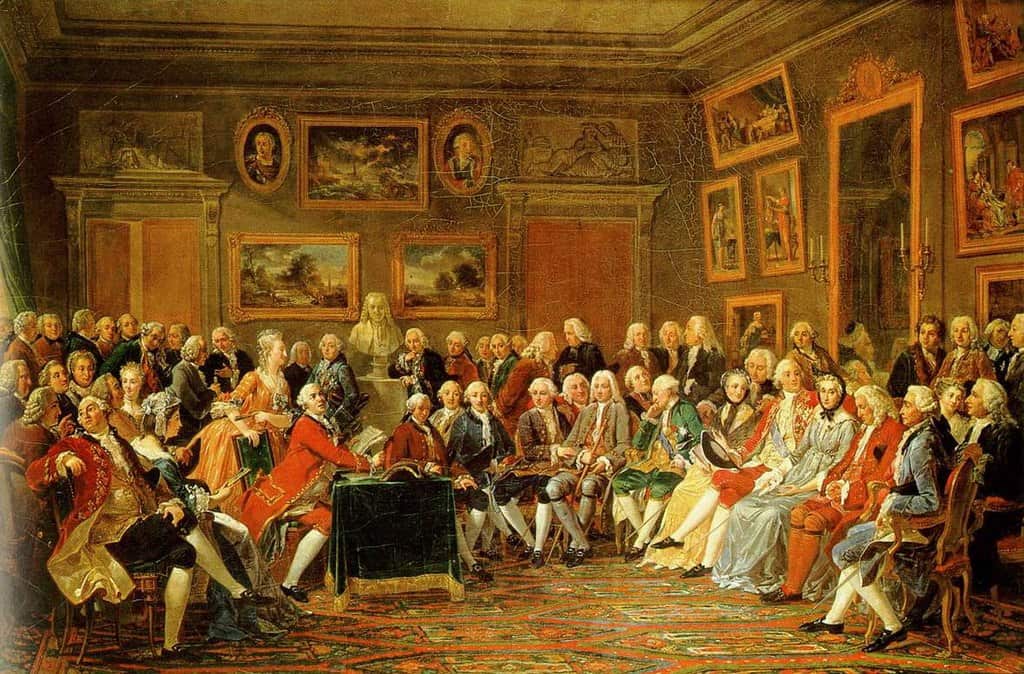
The Age of Enlightenment was a philosophical and intellectual movement that occurred in Europe during the 17th and 18th centuries, which emphasised reason as the primary means of comprehending the universe and creating objective systems of government, ethics, and aesthetics. The concepts of Enlightenment thinkers were heavily influenced by the scientific revolution, which demonstrated that systematic thinking could be applied to all human activities.
OVERVIEW
- There are several ways to characterise the Enlightenment, but in its broadest sense, it may be described as a philosophical, intellectual, and cultural movement that occurred in the seventeenth and eighteenth centuries. It placed emphasis on reason, logic, critique, and intellectual freedom over dogma, irrational belief, and superstition. Although logic had been used by the Greeks previously, it was now part of a worldview that claimed that empirical investigation and the study of human existence could shed light on the nature of human society, the self, and the cosmos as a whole. All were considered reasonable and comprehensible.
- The Enlightenment believed that there could be a science of man and that, with the appropriate ideas, human history could continue to develop.
- Therefore, the Enlightenment also promoted the idea that education and reason could be used to enhance human life and character.
- The universe could also be changed if it were viewed as a working machine, or in other words, as a mechanistic cosmos.
- As a result, the Enlightenment brought interested minds into confrontation with the political and ecclesiastical establishment; some have even referred to these individuals as intellectual "terrorists" who challenged the status quo.
- They opposed religion with the scientific method and often supported deism.
- The Enlightenment philosophers desired to change the world for the better because they believed that reason and science could make things better.
- Since there is no clear beginning or end point for the Enlightenment, many books simply state that it occurred between the seventeenth and eighteenth centuries. The second half of the seventeenth century and almost the entire eighteenth century were undoubtedly the most significant periods. ‘Leviathan’, by Thomas Hobbes was one of the fundamental political writings of the Enlightenment (and arguably of Europe). Hobbes was inspired by the English Civil Wars and Revolutions, and his works are occasionally cited as the beginning of history when dates are provided. Hobbes sought a new governmental system based on the reasoned application of science since he believed that the previous one had led to the brutal civil wars.
- Voltaire's death, one of the important figures of the Enlightenment, or the outbreak of the French Revolution, are usually cited as the end of the period. As ambitions to remake Europe into a more rational and equal system fell into carnage that killed prominent writers, this is sometimes cited as the event that signalled the end of the Enlightenment.
MAJOR IDEAS
PHILOSOPHY
- In the 18th century, Paris emerged as a hub of intellectual and scientific activity under the guidance of figures such as Voltaire, Rousseau, and Montesquieu. These philosophers promoted a society based on natural law and reason, in contrast to religion and Catholic theology. The framers of the United States Constitution adopted Montesquieu's idea of separating powers in government. Although many of these thinkers were aristocrats and not revolutionaries themselves, their ideas helped to challenge the established ideologies of the Old Regime and had an impact on the French Revolution.
- The rationalist philosophy of Descartes and Bacon's empiricism laid the foundation for Enlightenment thought. Descartes' attempt to establish a solid metaphysical basis for the sciences failed, as did his method of doubt, which he applied to philosophical issues and produced a dualistic system of consciousness and matter.
- Locke's ‘Essay Concerning Human Understanding’ (1690) and Hume's writings from the 1740s refined skepticism. Spinoza's unyielding insistence on the unity of matter in his ‘Tractatus’ (1670) and ‘Ethics’ (1677) challenged his dualism.
- According to Jonathan Israel, these thinkers established two distinct lines of Enlightenment thought. The first was the moderate school, following Descartes, Locke, and Christian Wolff, which sought to strike a balance between reform and the established systems of power and religion.
- The second was the radical school, influenced by Spinoza's philosophy and advocated democracy, individual liberty, freedom of expression, and the abolition of religious authority. The radical trend divorced theology entirely from the basis of morality, while the moderate variation tended to be deistic. A conservative Counter-Enlightenment eventually opposed both schools of thought and called for a return to religion.
SCIENCE
- In general, Enlightenment science was firmly rooted in the ideal of progress and growth and placed a high importance on empiricism and logical reasoning. Natural philosophy, which encompassed the study of science, was subdivided into physics, chemistry, and natural history, which included anatomy, biology, geology, mineralogy, and zoology. As with most Enlightenment ideas, not everyone agreed on the benefits of science: Rousseau criticised the sciences for creating a divide between humans and nature and failing to bring about greater happiness.
- Many authors and intellectuals of the Enlightenment had scientific backgrounds and believed that the rise of science would lead to the demise of religion and traditional authority and the growth of free speech and ideas. The Enlightenment witnessed several groundbreaking scientific discoveries, including the discovery of carbon dioxide (fixed air) by chemist Joseph Black, proof for the existence of deep time by geologist James Hutton, and the invention of the condensing steam engine by James Watt.
- The Montgolfier brothers' experiments enabled them to launch the first manned hot air balloon flight in 1783, and Antoine Lavoisier's work was used to construct the first modern chemical factories in Paris.
- Leonhard Euler made many significant contributions to mathematics, including significant findings in analysis, number theory, topology, combinatorics, graph theory, algebra, and geometry. He also made important contributions to mechanics, hydraulics, acoustics, optics, and astronomy in applied mathematics.
SOCIETY
- Hume and other Scottish Enlightenment thinkers developed a "science of man," which was expressed historically in the writings of authors such as James Burnett, Adam Ferguson, John Millar, and William Robertson. These writers combined a scientific examination of how people behaved in prehistoric and ancient cultures with a keen awareness of the driving forces of modernity. This movement formed the basis of modern sociology, while Hume's philosophical ideas, popularised by Dugald Stewart and directly influencing James Madison and the US Constitution, served as the movement's conceptual cornerstone.
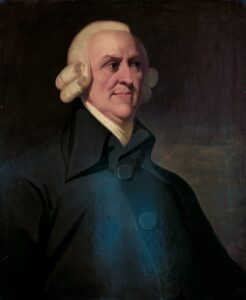
Adam Smith - In 1776, Adam Smith published ‘The Wealth of Nations’, which immediately affected British economic policy and continued to do so into the twenty-first century, making it sometimes regarded as the first work on contemporary economics. Anne Robert Jacques Turgot's ‘Reflections on the Formation and Distribution of Wealth’ followed shortly after and had an impact (1766). Smith acknowledged his debt to Turgot and may have been the author of the first English translation.
- Beccaria, a lawyer, criminologist, philosopher, politician, and one of the greatest writers of the Enlightenment, is best known for his opus ‘Of Crimes and Punishments’ (1764), which was later translated into 22 languages. It was a groundbreaking work that helped establish the fields of penology and the classical school of criminology by supporting criminal justice and opposing torture and the death penalty. Francesco Mario Pagano's ‘Saggi politici’ (Political Essays, 1783), ‘Considerazioni sul processo criminale’ (Considerations on the Criminal Trial), and other significant works helped establish him as a leading figure in the field of criminal law.
POLITICS
- The Enlightenment, which established democratic principles and institutions that gave rise to contemporary liberal democracies, is widely seen as the origin of modern Western political and intellectual culture. Political leaders who practised enlightened absolutism, such as Catherine II of Russia, Joseph II of Austria, and Frederick II of Prussia, were deeply influenced by Enlightenment ideas. The key figures of the American Revolution were also closely linked to the Enlightenment. Benjamin Franklin and Thomas Jefferson participated in European political and scholarly discussions and incorporated Enlightenment principles into the US Constitution and the Declaration of Independence.
- The idea of the social contract, a topic that pervaded Enlightenment political thinking, served as the foundation for Locke's governance philosophy, one of the most important Enlightenment theorists. This new argument was initiated in 1651 by the English philosopher Thomas Hobbes, who wrote the book ‘Leviathan’.
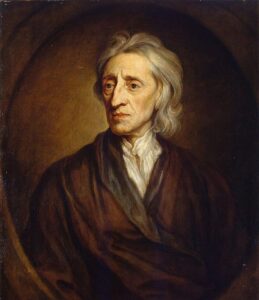
John Locke - The right of the individual, the inherent equality of all people, the artificial nature of political order, the idea that all legitimate political power must be "representative" and based on the consent of the people, and a liberal interpretation of law that allows people to do whatever the law does not expressly forbid were all concepts developed by Hobbes.
- In their separate works, ‘Two Treatises of Government’ and ‘Discourse on Inequality’, Locke and Rousseau created the social compact theories that hold that the agreement of the governed is what gives the government its legitimacy.
- While Rousseau held that civil man is corrupted and natural man is free, and that people enter civil society to achieve unity while preserving individual freedom, Locke held that all men are born equal with natural rights to life, liberty, and property, and that they enter civil society to protect those rights.
- Both ideas assume that there exist unalienable and universal natural rights. During the Enlightenment, slavery was abolished because it was both morally and politically undesirable. However, Hume and Ferguson argued that civil government is founded on a ruler's habitual power and force and that polities arose out of social growth. Not all Enlightenment philosophers agreed with the social contract idea.
RELIGION
- The religious commentary during the Enlightenment period was a response to the religious conflicts in Europe that arose during the Thirty Years' War. Enlightenment theologians aimed to reform religion while maintaining trust in God and preventing religious strife from escalating into political and military conflicts.
- Moderate Christians aimed to return to plain Scripture, as exemplified by Locke's "unprejudiced examination" of the Bible as a whole. Some freethinkers, such as Anthony Collins, rejected the distinction between actions that are "above reason" and actions that are "contrary to reason," insisting that revelation must account for human perceptions of God. Thomas Jefferson went even further to extract a practical Christian moral code for his "Jefferson Bible," excluding portions from the New Testament that dealt with miracles, angelic visits, and the resurrection of Jesus.
- New perspectives on religion emerged during the Enlightenment, including those of well-known figures such as Thomas Paine, Pierre Bayle, John Locke, and Voltaire. Bayle maintained that even atheists could be decent individuals, while Paine argued for deism, which emphasised faith in God as the creator without reference to any religious writings. Voltaire believed that atheists were more likely to cause trouble in society if they were not afraid of divine retribution, and Locke's view was that a lack of trust in God and divine law would result in moral anarchy.
IMPACT
- The Enlightenment was a transformative period in European history that profoundly impacted Britain. The ideas and values that emerged from the Enlightenment, such as democracy, individual liberty, and constitutionalism, influenced British political thought and practice. The concept of the "social contract" informed constitutional developments in Britain, while the Enlightenment inspired the American Revolution and the French Revolution, both of which had an impact on British politics.
- Scientific discovery and technological innovation during the Enlightenment had a profound impact on Britain's industrial and economic development. Scientists and inventors made significant contributions to fields such as physics, chemistry, biology, and steam engines, leading to the rise of the Industrial Revolution in Britain.
- The Enlightenment gave rise to a new culture of reason, rationality, and empiricism, which influenced literature and the arts. The works of writers and composers reflect the values of the Enlightenment, and the development of the novel as a literary form was a product of the period. It was a time of social and moral reform, with thinkers advocating for greater social justice and the abolition of slavery. These social and moral reforms had a lasting impact on British society and helped to shape the values and norms of the modern world.
- The impact of the Enlightenment in Britain was significant, particularly in the establishment of coffeehouses. These coffeehouses became centres for intellectual and political discussions, playing a vital role in the emergence of a new public sphere of political debate in Britain during the 18th century.
- The coffeehouses facilitated a culture of intellectual curiosity and encouraged critical thinking, and played a crucial role in disseminating information and shaping public opinion. They were centres of social and intellectual activity and contributed to the development of a culture of rational inquiry.
- The coffeehouses are a testament to the impact of the Enlightenment on British society and remain an important part of British cultural heritage.

